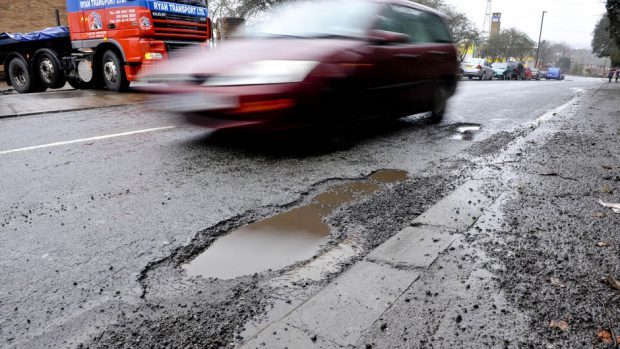Motorists could be taxed to fund pothole repairs amid concerns that struggling local authorities are unable to bear the burden of spiralling costs.
A leading transport body has suggested that a “pay-as-you drive tax” should be considered as a way of handling road maintenance costs in the north and north-east.
Vice-president of the Chartered Institution of Highways and Transportation, Neil Johnstone, made the argument when he appeared before MSPs yesterday at Holyrood.
Mr Johnstone’s proposal came after documents revealed councils’ anxiety about the “exponential” costs of fixing roads and potholes following multi-million funding cuts.
He said: “We do believe that we are in a place where, to unlock the problem, we need to consider pay-as-you-go methodologies.”
He said a road tax linked to how far, or where, drivers travel could work like many modern car insurance policies to raise revenue to be put towards repairing Scotland’s deteriorating roads.
A similar suggestion was made by Highland Council’s former director of transport, Philip Shimmin, who called for a “road charge” to pay for repairs.
In a document presented to the Rural Economy and Connectivity Committee, Mr Shimmin warned that roads were in crisis and funding levels were “unsustainable”.
Other papers revealed Aberdeenshire is facing an £84 million backlog for repairs to its 1,400 bridges and Moray faces a £40.7m road repairs backlog.
Aberdeen City warned repair costs are increasing “exponentially” and Moray and Aberdeenshire councils warned further cuts will result in more potholes, disruption and insurance claims against local authorities.
Since 2013 Moray had experienced a cumulative reduction in its roads repair cash of £8.63m from its revenue budget and £11.57m from its capital budget.
The paper submitted by Aberdeenshire Council said that, if its funding shortfall continued, it might be worth imposing weight limits on certain roads to prevent “catastrophic failure”.
But it warned such a measure could result in massive round trips of up to 180 miles in one case, which is understood to be the Invercauld Bridge at Braemar.
Aberdeenshire said weight limits could “in theory” prolong the life of the road network, but there would an impact on HGVs and farm vehicles.
“The resulting diversions for goods vehicles would impose additional costs on businesses and adversely impact on the economy. In rural areas these diversions can typically exceed 50 miles,” the Aberdeenshire document said.
It added that Aberdeenshire council was currently spending £2.4m per year on repairs.
Peter Argyle, Aberdeenshire’s infrastructure and services committee chairman, said: “We need to be spending about double that per year, but we simply do not have the resources.”
Highland Council’s transport committee chairman Allan Henderson calculated that it would take £176m to get its roads up to scratch.
He said close to £20m was already spent each year to deal with the council’s “crumbling” roads network.
“That’s for the repairs, which takes in the whole infrastructure bridges, ditches and everything associated with roads,” he said.
“It also has to pay for pay for all the staff and the lorries. The government will always say we are adequately funded, but like most councils we are strapped for cash. Spending the money we are spending we are only going south.”
Mr Henderson added that he thought a tax would be “too unwieldy” to administer, adding: “What we really need is some available funding to make proper repairs to our roads.”
